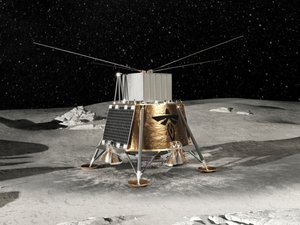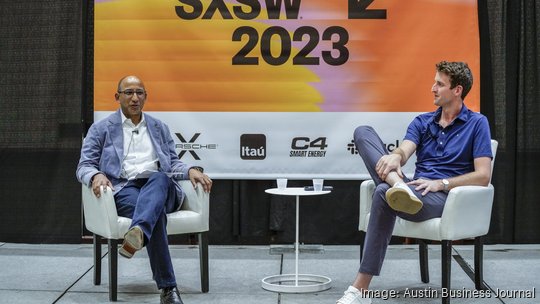
Local entrepreneur Whurley spent about nine weeks toiling on his hour-long South by Southwest presentation in 2018.
This year, it only took a few hours.
“Quantum computing and artificial intelligence are going to drive us into a completely new future,” Strangeworks Inc. founder and CEO Whurley said reading from a script during his SXSW session March 15. “And computing as we know it will change more in the next 100 years in the next 10 years than it has in the last 100. Note what I just said in that little mistake. It'll be important later.”
The 100-year snafu, it turned out, was a quirk. He later revealed that AI bots wrote his entire speech and were used to develop the images in his slideshow, as well as a slim magazine about quantum computing and AI that was given to attendees.
"I thought if it's doing the outline, and it did the abstract, and it's doing all the art and the slides, why can't it just put words in my mouth, too," he said. "And so I did it on ChatGPT3, and then [ChatGPT4] was released yesterday. So I redid all of it. And as you saw there were several little tiny [mistakes]. Most of those are not on the AI. Almost all of those are on me. I didn't like the me/us thing. Or the 'love' thing. It was a weird way to talk about my blog. But outside of that, I would say it did a pretty astoundingly good job of, in hours, creating every single aspect of the presentation you just saw. And I hope that blows your mind. Because, as I tell you, doing it blew my mind."
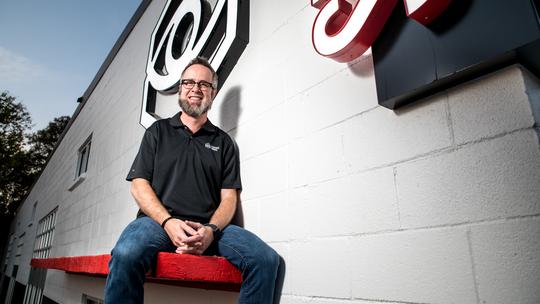
The dramatic shift in how long it took Whurley to drum up a one-hour speech is a small anecdote about how AI is already changing the world around us. It’s likely his presentation wasn’t the only one at SXSW crafted with an AI assist.
AI tech has been in development for decades. But all of a sudden it is moving so fast that while some of us are just discovering a few of its simple use cases, others are envisioning a radically remade world.
Some of Austin's leading tech visionaries depict fantastical futures where AI writes software in real-time, rendering all other software obsolete and giving consumers any imaginable app in seconds. Others warn of dystopian hellscapes where AI quickly leaps to general intelligence, or AGI, and super intelligence. Or, perhaps more immediately, it quickly widens our already wide socio-economic gaps in wealth, resources and education.
The conjecture about where AI will take us varies a lot. But there seems to be widespread agreement that AI as we know it today will quickly have an impact on nearly every industry and that virtually every CEO of a major company is being asked how they'll integrate AI to be more efficient or make more money.
Mark Rolston is co-founder of Austin-based digital design and consulting firm Argodesign, and he also used AI to drum up copy and images for his presentation.
Argodesign has been working with advanced AI companies such as Builder.AI, which is working on enterprise-level scaling AI-generated apps in the moment, and Apptronik, an Austin startup that has developed a humanoid robot equipped with AI.
He, like many speakers focused on the future of AI, warned of the potential for people to misuse AI to spread false information and suggested AI will almost certainly augment many jobs. But he mostly focused on a future where AI is embedded in many of our household appliances and is capable of instantly hatching software applications based on simple suggestions.
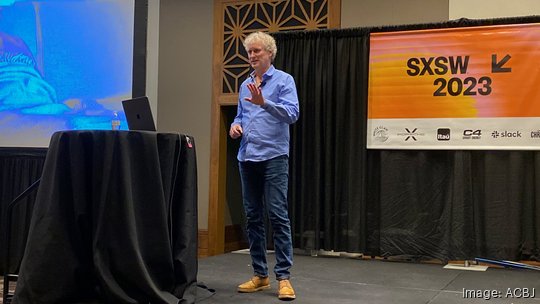
He said it's a large logical leap, but technically these real-time apps aren't far away.
"Think of all of the companies out there — all the individual producers or individual users who need and buy and store software. It runs the world. Imagine all of that not existing, but instead being made each time we encounter a need. That's a phenomenal shift. And it does produce this idea of a real-time and internet — not have everything sitting idly waiting for us, but made as we asked for."
Of course, if that future emerges quickly, many of our jobs would be transformed, if not eliminated.
"Every field is going to be a little bit, not a little bit, a lot — incredibly pressed — for reasoning why they need to exist," Rolston said. "And there's frankly a lot of crap being produced by humans that probably will happily move to an AI, right? A lot of copywriting..."
The firm's copywriter happened to be sitting in the second row as he said it. Rolston apologized as the crowd giggled and noted that she'd still have a job — it'd just involve less copywriting and more AI prompting. It'll be more about arguing with the computer to get results, he said, noting that it's not that much different than how he argues with his team of humans to get results.
Rolston said this type of tech would also likely be used to customize movies, music and more. For example, he suggested families might sit down to watch a Star Wars holiday special and prompt the AI to depict all of the characters as cats. Meanwhile, advertising might be directed to individuals, a sort of next level of targeted ads that could instantly produce ads with pictures of how you'd look in a certain pair of tennis shoes or a particular dress.
"We're having a hell of a fun time embracing just the absurdity of what can be created ... anything you can imagine, there's such a little gap between that and seeing it or experiencing it both in functional terms, artistic terms, musical terms ... any term can be produced with such low effort that we will for a while, just aggressively embrace the absurdity," he said.
These advances raise plenty of ethical issues.
"There's so much threat mongering around this topic, it's not really healthy," he said. "But it's something we're going to have to grapple with."
Perhaps the most obvious is when AI is trained on an artist's work. Rolston showed a picture of the Mona Lisa painting, noting that AI could recreate something that is, on its face, just as good and could then instantly produce a thousand variations of it. That will challenge our notion of preciousness and exclusivity.
But that doesn't mean that the original Mona Lisa, or any number of other artistic works, becomes worthless.
"I think we start to learn where value really lies," he said. "Even though AI creates just about anything, I think we will learn better about ourselves what we truly value and that is good for us."
This week's release of OpenAI's GPT4 brings with it a wave of new possibilities, as well as a batch of new concerns. A research paper that accompanied the launch says that it won't provide details on what the AI was trained on or its training methods due to "both the competitive landscape and the safety implications of large-scale models like GPT-4."
The paper also warns that the AI, when given unsafe inputs, "may generate undesirable content, such as giving advice on committing crimes."
OpenAI's paper also says that new capabilities often emerge with more powerful models. "Some that are particularly concerning are the ability to create and act on long-term plans, to accrue power and resources."
So there are plenty of reasons to move forward cautiously.
Data.world is an example of an Austin startup that has been built with an AI future in mind.
In a March 6 interview, co-founder and CEO Brett Hurt said GPT3 was a stunning advance that his whole team has marveled over.
"The future is actually here," he said. "And we're well prepared for it because we set up our company on the right foundation from the beginning."
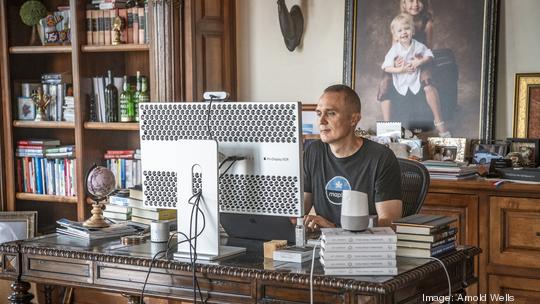
The startup has built massive libraries of data sets that are used by a broad range of businesses, including the Associated Press, one of the world's largest journalism organizations.
Data.world's team had early access to variations of OpenAI's GPT models, and earlier this month the company announced it is opening an AI lab dedicated to integrating new features into its data systems. For example, AI can help identify which databases to use to answer complex questions, as well as describe what data sets contain and suggest queries that might unearth new data insights.
"But I want to also be cautious about this because, as we've seen in the news and everything, what they call hallucinations, it's generating things that are not true," Juan Sequeda, principal scientist at Data.world, said. "So when we're starting to go talk to a lot of our customers or partners, they're very cautious. They agree this is a shiny object. It can be very powerful. But also it can generate things that may be false, may be misleading, which increases the need to have what we're calling governance around these things."
Dave Rogenmoser, co-founder and CEO of Jasper AI, said his startup, which is valued at more than $1.5 billion, also had early access to OpenAI's GPT models. It became the platform upon which the startup built its generative AI platform for marketing and content teams.
Their early access also gave them a head start on many other companies, and it quickly ramped up revenue and went from 10 employees to about 170 in roughly a year. When ChatGPT became available to the public, it would be easy to think that Jasper had been undercut.
Rogenmoser said he heard about ChatGPT in a Slack channel with OpenAI and its users. He didn't think much of it at the moment, but returned to the conversation and was blown away.
"There were sort of a few weeks where it was like, 'What does it mean for our company?'" he said.
In the end, he said he doesn't feel Jasper is threatened because Jasper has a customer base, targeted use cases and a big head start on competitors using GPT to power their platforms.
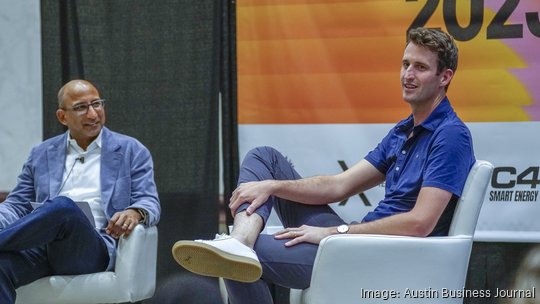
Sameer Dholakia of Bessemer Venture Partners, which invested in Jasper, said the public launch of ChatGPT might actually benefit Jasper and other AI startups.
"When you have these, what feels like existential moments, oftentimes it is a big player that's doing something," he said. "It often ends up just growing the market. It just ends up growing mindshare, growing attention."
But there's fierce competition among AI startups and a lot of thirst for innovation at big corporations around the globe.
"There's not another leader in the country that's not being asked, 'Hey, what are we going to do here?'" Dholakia said.
Meanwhile, the rest of us are coming to terms with what AI means today. For example, it could easily summarize this article into a few paragraphs for people short on time, or write a cover letter for a job in the voice of Ernest Hemingway or Yoda. In fact, there's already a Hemingway Editor app that does that.
It has implications from the board room to the classroom.
In a conversation with University of Texas at Austin President Jay Hartzell, prominent VC Jim Breyer said he's not long on OpenAI as a company, but he strongly believes AI is changing the world and is most excited about the use of AI in medicine.
"I still so often hear from really good doctors about, 'Why would I use technology to analyze a pathology slide?' And I said, 'Because with the use of technology, we're making the humans smarter.'"
He said about one-third of the pathology slides for prostate and breast cancer are incorrect at many of our best hospitals. With AI, he said patients and doctors can get data returned in two days instead of 10 and the accuracy shifts to 95%. He said conversations and press coverage of AI are often black and white, good or bad.
"It's never that black and white," he said, noting a broad spectrum of applications. "And again, AI is not about replacing doctors. It's about improving the doctor's ability to deal with the patients."
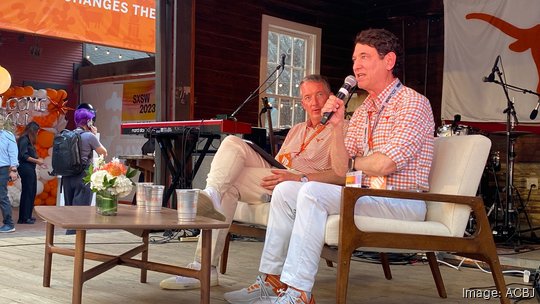
Meanwhile, Hartzell said there are immediate implications that ChatGPT has for professors and students alike.
"ChatGPT has the faculty at UT freaked out," Hartzell said, noting forthcoming classroom changes. "We're gonna' do more in-class exams, more oral exams, but also things like seeding the entire class with the ChatGPT answer, and then say, 'Now make it better.'"
He hinted at the idea that AI will, like many technologies before it, become a tool that we use rather than a digital overlord that manages and creates everything for us.
"And so you think about how students are gonna' spend their time, it's going to be improving what the technology gives him or her," he said. "It's not just the low ends and sort of low-skill stuff that's going to change. It's going to be the high-end things ... how we teach, how students learn, and the like."
Need an example? I gave ChatGPT this story, or at least everything above this line, and asked for ways to improve it.
Among its five suggestions: "Include different perspectives: While the article does touch on some of the ethical concerns surrounding AI, it mainly focuses on the views of a few tech experts. Adding more diverse perspectives, such as those from policy-makers, social scientists, and ethicists, would provide a more comprehensive understanding of the issues at hand."
And the AI doesn't exactly wear kid gloves.
"Some sentences are long and convoluted, and the transitions between topics could be smoother," ChatGPT said. "Simplifying the language and organizing the information more clearly would make the article more accessible to a broader audience."

